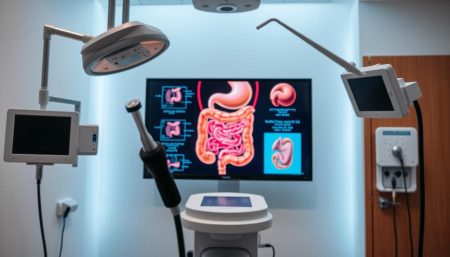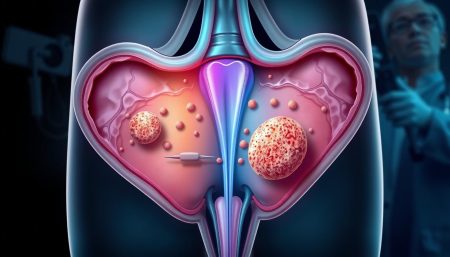What's Hot
- Understanding Metastatic Cancer and Treatment Options
- Understanding Lymphoma Cancer: Symptoms & Treatment
- Don Omar Cancer: Updates on Reggaeton Star’s Health
- Inflammatory Breast Cancer: Causes and Warning Signs
- Early Signs and Kidney Cancer Symptoms to Watch For
- Understanding Sarcoma Cancer: Types and Treatment Options
- Early Signs and Thyroid Cancer Symptoms to Watch For
- Early Signs and Symptoms of Colon Cancer to Know
Anal Cancer
When we talk about sexual health, a big question is whether anal sex can lead to cancer. This topic is sensitive and needs a careful approach. We want to share the facts in a way that’s both personal and scientifically…
Exploring: Can a Colonoscopy Detect Anal Cancer?
When we think about health, especially cancer, early detection is key. We might wonder if a colonoscopy can find anal cancer. This question leads us to look into colonoscopy’s role in finding anal cancer early. Looking into this, we find…
Anal Warts: Cancer Risk After Surgery Guide
People facing surgery for anal warts worry about many things. They especially worry about the anal warts cancer risk after surgery. The American Cancer Society says it’s key to know about possible problems after removing anal warts. Research shows a…
How Is Anal Cancer Diagnosed?
Getting a cancer diagnosis can be overwhelming. For those facing anal cancer, knowing how it’s diagnosed is key. Early detection and accurate diagnosis are vital for treatment success. This guide aims to explain the anal cancer diagnosis process in a…
When you’re told you have anal cancer, many questions pop up. One big one is, “is anal cancer curable?” Understanding this disease can be tough, with lots of medical terms and stats. But, there’s hope. Thanks to better detection and…
Anal Cancer
At first mention, anal cancer might not be as widely discussed as other forms of the disease, yet its impact on health management is just as significant. Understanding the nuances of an anal cancer diagnosis is crucial for effective treatment and improving patient outcomes. With advancements in anal cancer treatment options, those affected can harness knowledge for empowerment, turning a diagnosis into a journey towards recovery.
This guide aims to shed light on the realities of this condition. We will explore the importance of recognizing symptoms early, evaluating risk factors, and exploring prevention strategies. As we delve deeper into the subject, we will also explore the anal cancer survival rate, which is a testament to the progress in medical interventions and patient care strategies.
Join us as we navigate the complexities of anal cancer. Our goal is to enhance awareness and health management, embodying a proactive approach to this challenging health issue.
What You Need to Know About Anal Cancer
Understanding anal cancer is key for health awareness and spotting early signs. It starts with knowing the anal cancer causes and the need for early detection.
Defining Anal Cancer and Its Significance
Anal cancer affects the anus’s tissues and is mainly caused by the human papillomavirus (HPV). It mostly happens in the cells lining the anal canal. Knowing why it occurs helps in preventing it, as explained in the comprehensive resource on anal cancer causes from the Mayo Clinic.
Overview of Anal Cancer Prevalence in the United States
Recent anal cancer statistics show its growing presence in the United States. This rise highlights the need for more health awareness and screening. These numbers are vital for doctors and patients, guiding early detection and treatment.
Identifying and Understanding Anal Cancer Symptoms
It’s important to know the signs of anal cancer early. This helps in getting better treatment. We’ll talk about the main anal cancer symptoms and why you should see a doctor fast.
Common Symptoms and When to Seek Medical Advice
Anal cancer can show up in different ways. These signs might look like other, less serious problems. Look out for unusual bowel movements, bleeding, pain, and lumps near the anus.
If you notice these, see a doctor right away. Getting help early can lead to better treatment and more chances of beating the disease.
Why Early Detection of Symptoms Matters
Early diagnosis is key in fighting anal cancer. It opens up more treatment options that are less harsh and work better. Spotting anal cancer symptoms early and getting medical consultation fast can greatly improve your chances of survival.
So, it’s crucial to keep an eye on your body and know what to look for. This way, you can fight this disease more effectively.
Risk Factors and Prevention Strategies for Anal Cancer
Knowing the anal cancer risk factors is key in fighting this disease. A major risk is HPV infection, which is a big player in anal cancer. Other risks include having had certain cancers, like cervical cancer, and a weakened immune system, often due to HIV. Lifestyle choices, like smoking and having many sexual partners, also raise the risk.
To prevent anal cancer, making healthier choices is crucial. Quitting smoking and avoiding tobacco can greatly reduce risk. Vaccination is also vital. HPV vaccines can prevent HPV infection, which lowers the chance of getting anal cancer. Regular screenings are also key, as they help catch cancer early and improve treatment chances.
It’s just as important to educate people about anal cancer prevention. Raising awareness about HPV vaccines for both men and women is essential. Encouraging safe sex and regular doctor visits can help lower anal cancer rates. By changing lifestyle choices and taking steps like vaccination and screenings, we can fight anal cancer more effectively.
FAQ
Q: What is anal cancer and why is it significant?
A: Anal cancer starts in the anal canal, the tube at the end of your rectum. It’s less common than many cancers but can be deadly if not caught early. Knowing about anal cancer helps with early detection and treatment.
Q: What are the recent statistics on anal cancer prevalence in the United States?
A: In the U.S., anal cancer cases have been increasing. Each year, about 8,300 new cases are diagnosed, and 1,280 people die from it. These numbers show why health awareness and early detection are key.
Q: What are common anal cancer symptoms and when should you seek medical advice?
A: Symptoms include rectal bleeding, itching, pain, lumps, and bowel changes. If you have these symptoms for more than a few days, see a doctor. They can help diagnose and treat the cancer.
Q: Why does early detection of anal cancer symptoms matter?
A: Finding anal cancer early can greatly improve treatment success. Early treatment is often less invasive and more likely to cure. So, watching for symptoms and getting regular check-ups can save lives.
Q: What are the known risk factors for developing anal cancer?
A: Risk factors include HPV infection, many sexual partners, smoking, and being over 50. Knowing these can help you make healthier choices and lower your risk.
Q: How can anal cancer be prevented?
A: To prevent anal cancer, get the HPV vaccine, practice safe sex, and don’t smoke. Also, reduce sexual partners and get screened if at high risk. Healthy choices can lower your risk of getting anal cancer.
Q: What are anal cancer treatment options?
A: Treatments include surgery, radiation, chemotherapy, or a mix of these. New treatments are also being tested. Your doctor will choose the best treatment for you based on your situation.
Q: What is the survival rate for anal cancer?
A: Survival rates vary by stage. For early-stage cancer, the 5-year survival rate is about 82%. It drops to 59% for regional spread and 30% for distant spread. Early diagnosis and treatment are crucial.
Q: How is anal cancer diagnosed?
A: Diagnosis involves physical exams, imaging tests, and biopsies. Specialists may also use an anoscopy to examine the anal canal. These steps help confirm the cancer.
Q: Are there any lifestyle changes that can reduce the risk of anal cancer?
A: Yes, quitting smoking, safe sex, a healthy weight, and a diet rich in fruits and veggies can help. These changes can improve your health and lower your risk of anal cancer.
















